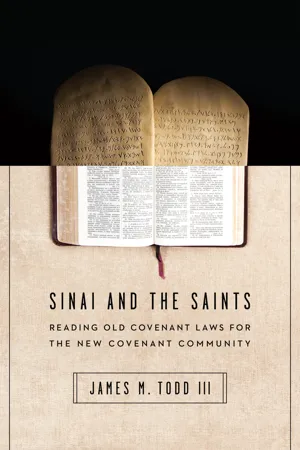Definitions are very important in life. Although we often take our shared understanding of words for granted in everyday life, certain events can quickly remind us how important a proper understanding of words is. One such event is learning a new language. Anyone who has traveled internationally and attempted to speak a foreign language has probably experienced the awkward laughs of native speakers when he or she has used the wrong word in a sentence. Even if you have not traveled internationally, you have probably been on the laughing side of this equation at some point in your life.
Using the wrong word when interacting with someone who speaks a different language can be rather humorous, but in more serious matters, definitions carry much more weight. As we have already noted, this book’s topic is an important issue for Christians, and as we will demonstrate in the next chapter, it is controversial. Hence, much more is at stake in the present task than a foreigner’s choice of the wrong word. So, let’s begin by defining our terminology.
THE MEANING OF “TORAH”
Many of us properly associate the English word law with specific rules given by a government for its citizens. Most countries have a variety of laws dealing with anything from traffic to property to criminal activity. We can categorize these laws in numerous ways and sometimes designate them statutes or legislation (collectively).
Many Christians, upon reading the word law in their English translations of the Bible, associate their common understanding of the English word with the biblical text. Although the meanings of the biblical text and the modern usage of the word law might be the same, we should not assume so until we have consulted the original languages.
Since the Old Testament was written in Hebrew (with a sprinkling of Aramaic, primarily in Daniel and Ezra), we have to look beyond the English translation to the Hebrew word under consideration. For the most part, the Hebrew word translated “law” throughout the Old Testament is torah. This Hebrew word has a broader meaning than simply “rule,” just as our English word law has a broader meaning. For example, we often use law to refer to those who enforce the law (“Don’t get in trouble with the law”). According to standard Hebrew lexicons, torah has two primary meanings: (1) general instruction and (2) particular instruction (i.e., a rule).1 Even though the second definition overlaps with our modern understanding of “law,” we rarely think of “law” as general instruction. However, the Hebrew Bible often uses the word torah in such a manner (e.g., Deut 1:5; Prov 1:8; 4:1). Therefore, when we read the word law in our English Bibles, we must be cognizant of the different meanings of the Hebrew word torah.
How then do we know which meaning a biblical author intends? As with any word that has multiple meanings, the context in which the word is used determines the meaning of the word. Let’s look at another English example. The word chair can refer to either the person who leads a committee or an object upon which one sits. We determine the meaning of the word simply by reading the sentence in which the word is used. We use the same process with the Hebrew word torah.
Since this book focuses on the particular instructions given to Israel in specific portions of the Old Testament, the word torah in many of our discussions will involve the second meaning—that is, rules or specific instructions.2 This word has several synonyms in the Old Testament. Genesis 26:5 provides a good sampling of these synonyms. In this verse, the Lord states concerning Abraham: “Abraham obeyed my voice and kept my charge, my commandments, my statutes, and my laws.” Thus, when the Old Testament authors refer to specific laws, they often use the words “commandment” (mi.swâ), “statute” (.hōq or .huqâ), and “judgment” (mišpā.t) (see Deut 4:8) interchangeably with “law” (torah).
THE LAWS UNDER CONSIDERATION
Linguists typically distinguish between the meaning (concept reflected in the dictionary) and the referent (the person, place, or thing to which a word refers) of a word. For instance, the Hebrew word yi.s.hāq means “he laughs.” In the book of Genesis it refers to Abraham’s son Isaac, but in my family it refers to my son Isaac. The meaning of the Hebrew word has not changed, but the possible referents have. If someone uses the word Isaac in our house, the context of the conversation determines whether that person is referring to Isaac Todd or Isaac, the son of Abraham. In a similar manner, whenever we encounter the word law or laws in the Bible, we have to determine which law or laws the biblical author is referencing.
A precise identification of the law(s) under consideration is essential for a proper analysis of the Christian’s obligation to the Old Testament laws. Christians often make general references to “God’s law(s),” “biblical law(s),” or “God’s commandment(s)” without specifying which laws they have in mind. Such generalities are not helpful.3 For example, when Jesus says in John 14:15, “If you love me, you will keep my commandments” (he makes similar statements in vv. 21 and 23), we must identify his commandments. Is it every command in the Bible? Is it the commands in the New Testament? Is it just the commands that Jesus gave during his time on earth? If our obedience to these commandments measures our love for him, then we had better know which commandments he wants us to obey. To alleviate some of vagueness of this discussion, I will identify the specific laws that we will examine for the rest of the book.
Did you know that the first commands God gave in the Bible were not the laws given to Israel at Mount Sinai (beginning in Exodus 20)? God gave his first law, often termed the creation mandate, to the first human beings, Adam and Eve. Genesis 1:28 records this first command: “Be fruitful and multiply and fill the earth and subdue it, and have dominion over the fish of the sea and over the birds of the heavens and over every living thing that moves on the earth.” As the Creator and king of the universe, God gave his vice regents a specific task to perform, a task integrally related to his creation of humankind in his image.
God gave Adam a second law or command after placing Adam in the Garden of Eden: “You may surely eat of every tree of the garden, but of the tree of the knowledge of good and evil you shall not eat, for in the day that you eat of it you shall surely die.” (Gen 2:16-17). Of course, Adam (along with his wife, Eve, and thanks to the serpent) failed to obey this law and rebelled against his king, thus opening the floodgates of sin and making it necessary for God to give more laws.
If we fast-forward a few chapters, more commands appear after Noah exits the ark. Just before giving Noah permission to eat meat (Gen 9:3), God repeated the creation mandate to Noah and his sons (Gen 9:1). God also commanded Noah not to eat meat with blood and gave a law regarding the punishment of murderers (Gen 9:4-6). As we continue reading the Old Testament, we encounter various laws and commands given to numerous individuals and nations. In each instance, the responsible reader must interpret and apply such laws according to their context.
In my introduction, I mentioned the “Old Testament laws” on several occasions. I presented the laws in such a manner to avoid confusing my readers in the introduction, but my topic is actually narrower than the Old Testament laws. This book focuses on the group of laws given to Israel at Mount Sinai and throughout their journey from Sinai to the Promised Land (Ex 20–Deut). God did not give these laws to all humanity; he gave them to a specific group of people at a specific time in a specific place for a specific purpose. These laws are part of a covenant that God made with his chosen people Israel after he delivered them from the oppressive hand of Pharaoh (Ex 1–15).
Before looking at this particular covenant, it is important to understand covenants in the ancient Near East. Modern Christians often use the word covenant to describe marriage. In so doing, they emphasize the sacred seriousness of the marriage commitment in contrast to lesser commitments one might make (e.g., a commitment to go to the store with a friend). This understanding of a covenant parallels covenants in the ancient world. Covenants were common in the ancient Near East and consequently the Bible. Much like the way we sign modern contracts, individuals and nations formalized their agreements with a covenant, which was a binding agreement between two parties. The Bible records covenants between individuals (1 Sam 20:16-17), kings and individuals (Gen 21:31-32; 26:28-31), kings (2 Kings 16:7-9), God and individuals (Gen 15), and God and nations (Ex 19–24). The covenant God makes with Israel at Sinai falls under the final category.
EXCURSUS: THE OLD COVENANT AND ANCIENT NEAR EASTERN VASSAL TREATIES
Yahweh’s covenant with Israel at Sinai reflects many elements in Hittite vassal treaties of the second millennium BC. These treaties were made between a powerful king (the suzerain) and a subject king (vassal). They often highlighted the suzerain’s benevolent actions toward the vassal and outlined the stipulations for the vassal. A typical suzerain-vassal treaty contained the following elements:4
Identification of Covenant Giver
Historical Prologue
Stipulations
Provision for Deposit and Periodic Public Reading
List of Witnesses
Blessings and Curses
The Pentateuch gives evidence of adapting such treaties by the form and wording of certain sections in the Sinai legislation. Scholars have identified parallels with these treaties in Exodus 20–24 and the book of Deuteronomy. These parallels are important because they provide another metaphor by which to understand Yahweh’s relationship with Israel. As their suzerain, Yahweh provided his vassal with numerous benefits, which served as the basis for the people’s allegiance to him.
TITLES OF THE COVENANT
Names and titles communicate something about the person or thing to which one assigns them. Many parents (especially in the ancient world) recognize the significance of a name and therefore carefully consider the name they assign their child. The best examples of the importance of names come from the Bible itself. Numerous names reflect the parents’ desire for the child (Gen 5:28-29), the circumstances of the child’s birth (Gen 21:1-7), or the child’s appearance (Gen 25:25). The significance of a name or title is not limited to human beings. In the modern world, business owners often give their businesses a name that reflects their mission or highlights certain features of the business. Many hospitals and universities name buildings in honor of donors who make significant contributions to the organization. We even name animals based on a distinguishing characteristic (e.g., great white shark, whitetail deer, and catfish).
Such communicative significance also applies to the titles of the various biblical covenants. Over the years, biblical scholars have assigned several titles to God’s covenant with Israel at Sinai, a couple of which come directly from the biblical text. As one would expect, each of these titles highlights a different aspect of the covenant and therefore enhances our understand...

